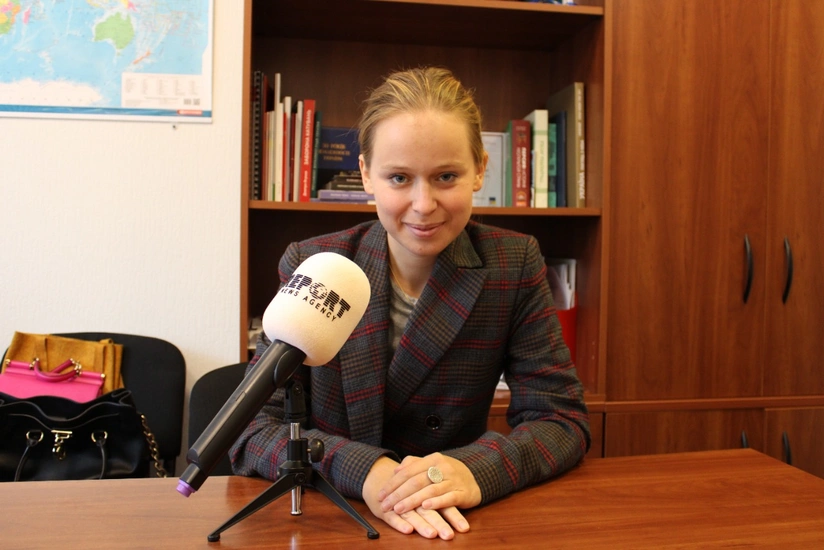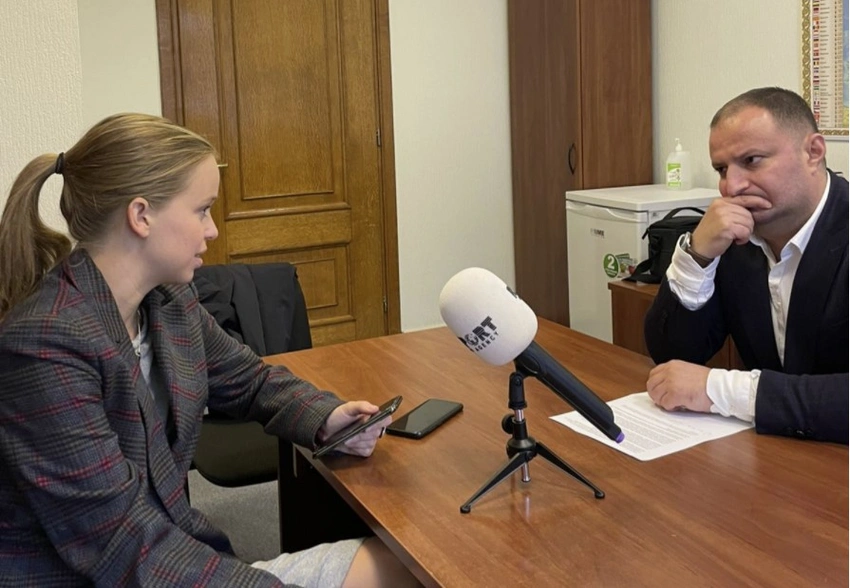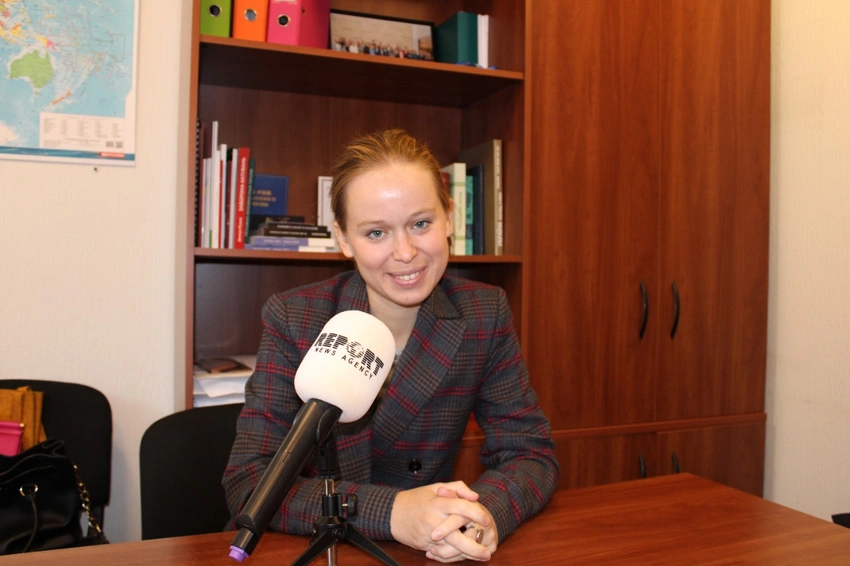Ukrainian MP: Reviewed agreement on cooperation with Turkey can be undertaken in relations with Azerbaijan as well
- 02 October, 2021
- 06:07

Eastern Europe Bureau of Report presents an interview with Chairperson of the Sub-committee on Inter-Parliamentary Cooperation, Bilateral and Multilateral Relations of Ukraine’s Verkhovna Rada, MP Yelyzaveta Yasko
- Ukraine has adopted a new strategy for external cooperation. How will this innovation manifest itself in inter-parliamentary relations, including in cooperation with Azerbaijan?
- Our parliament has been operating for over two years. At the committee level, we adopted a document on the priorities of our inter-parliamentary activities. One of the priorities was to maintain and develop ties to protect our territorial integrity. This is a crucial question for us. Therefore, it is essential for us to expand cooperation through all international platforms, both with those who consistently support us and with those who cannot openly express their support for one reason or another. This is a question of peace, a question of territorial integrity. As for Azerbaijan, we have always openly, mutually supported each other at the state level on the issue of territorial integrity.
- The recently adopted National Security Strategy of your country noted that the strategic partners of Ukraine are Turkey, Azerbaijan, and the Baltic states - Latvia, Lithuania, and Estonia. Is it possible for the Ukrainian parliament to make any decision, say, on the reset of relations with Azerbaijan?
- At the committee level, we reviewed one of the agreements on cooperation with Turkey in the defense sphere. In theory, a similar step can be taken in relations with Azerbaijan. But at the moment, we haven’t received such an initiative. I believe the Ministry of Foreign Affairs is doing proper work in this area. At the same time, I must note the work of our inter-parliamentary friendship group with Azerbaijan.

- What was envisaged by the agreement with Turkey for cooperation in the defense sphere?
- Strengthening our armies, exchange of experience. Turkey provides us with support, including on the issue of Crimea.
- Azerbaijan, at various levels, including at the parliamentary level, in the UN General Assembly, supports the sovereignty of Ukraine. Is there a possibility of discussion in the Ukrainian parliament of a document on the genocide of Azerbaijanis? For example, recently, the Verkhovna Rada has received an appeal in connection with the Khojaly genocide.
- As far as I know, the 30th anniversary of this tragic event is approaching. But the committee didn’t receive a specific document. If such an initiative is submitted for consideration, first, you need to familiarize yourself with the document. I would like to stress once again that Ukraine supports the territorial integrity of Azerbaijan.
- Are you aware of the Khojaly genocide?
- Yes, I have information on this matter. But I must admit that the Ukrainian public does not often discuss this issue.
- The Verkhovna Rada has a working group for operating with countries that do not recognize the territorial integrity of Ukraine. How justified is the existence of such a working group? Will the Verkhovna Rada, your parliamentary committee, discuss and make any decisions concerning countries that don’t recognize Ukraine’s sovereignty?
- The most painful issue for us is the attitude of Russia. It is unacceptable for us when one of the Russian agents dictates to our parliament the need to improve relations with the parliaments of the so-called regimes. The second painful question concerns Belarus. We are aware of the enormous influence of Russia in this country.
As for Armenia, the statistics of the voting results testifies that on many resolutions, the position of Armenia is consonant with Russia. However, in the course of frank conversations, the representatives of Armenia express a great desire to support the territorial integrity of Ukraine. Still, for specific reasons, they cannot do this. Their position is incomprehensible to us.

- Nobody should vote against sovereignty for some reason. This applies to every country, not just Armenia. For example, at the last session of the UN General Assembly, Italy opposed the sovereignty of Ukraine. If they don’t recognize the sovereignty of your country, why work with them?
- Firstly, diplomatic relations are being established at the level of parliaments. Our relations with Italy have a fairly long history. We understand that some politicians in the Italian parliament are unfortunately loyal to Russia. Alas, there are also those voting against us in Europe. For example, we know that several Council of Europe deputies, who either take a neutral position or openly don’t support us, represent specific political forces. They prefer to either be friends with Russia or remain neutral.
- Ukraine is now at the stage of serious reforms, especially in finance and law enforcement. How can the parliament help this process?
- We are ready to make essential decisions in various areas. Concerning parliamentary assistance, we attach great importance to democracy. For this reason, our deputies are deprived of immunity. The Ministry of Digital Transformation continues to implement various innovations. As for the law enforcement agencies, as you should know, the interior minister was recently dismissed from his post. We have high hopes for the new minister. We believe that he will do a lot to fight corruption and organized crime. Let’s wait and see.
- There is an opinion that after the revolution, the reforms in your country slowed down. Who or what is hindering their rapid flow?
- Not everyone wants reforms. We have a systemic bureaucracy. Lack of political will sometimes get in the way. Corruption remains a big problem for Ukraine.
- They say that the oligarchy hinders Ukraine’s development. Mikheil Saakashvili spoke about this quite often. Is there such a problem?
- In my opinion, we are hindered by the presence of corruption at all levels. Corruption among oligarchs, in society, in offices. I don’t think it’s all about the oligarchy. This problem is just one of many.
- There is an opinion in Ukrainian society that the current composition of the Verkhovna Rada is not very successful. Do you share this opinion?
- In my opinion, parliament is a mirror of society. I know MPs who work hard. At the same time, there are people in parliament who don’t understand why they are there or simply behave this way because of particular interests. Time will judge everything.
- How active do you think the representatives of ethnic minorities are in Ukraine, which is implementing reforms?
- I would like them to be more active.
- What prevents them from being more active?
- We have a low level of communication in connection with what is happening in the regions.
